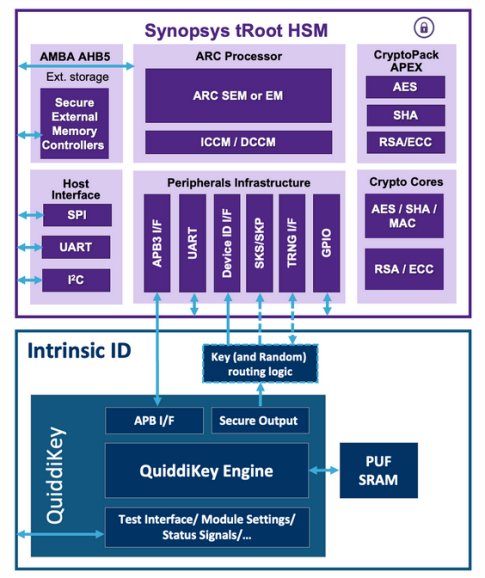Intrinsic ID Collaborates with Synopsys to Boost SoC Security and Accelerate Time to Market
Seamless Integration between Intrinsic ID PUF and Synopsys tRoot HSM Security IP Solutions Provide Strong Device-Level Protection
SUNNYVALE, Calif., Sept 6, 2022 – Intrinsic ID, the world’s leading provider of Physical Unclonable Function (PUF) security IP today announced a renewed collaboration with Synopsys, Inc. to provide pre-verified PUF and hardware secure module (HSM) security solutions that protect connected devices against advanced security threats. The Synopsys tRoot™ HSM IP now offers easy integration with Intrinsic ID QuiddiKey® hardware IP implementing SRAM PUF, enabling designers with little security experience to quickly add system and data protection features to their SoC designs. Additionally, Intrinsic ID CEO Pim Tuyls will be speaking about the collaboration at the Synopsys ARC Processor Summit on Sept 8, 2022 in a talk entitled “Rooting Trust in Hardware with Invisible Keys from SRAM PUF Technology.”
Cyberattacks are on the rise: according to Check Point Research, corporate cyberattacks spiked 50% in 2021, reinforcing the need for device-level security. An embedded HSM is one of the strongest ways to implement secure authentication, trusted communication, and data protection. Combining the HSM with PUF technology adds an additional layer of protection by generating secure cryptographic keys based on device-unique variations within the silicon of the chip itself. With the SRAM PUF from Intrinsic ID, the root key is re-generated every time the chip is powered up and is only available (in volatile memory) when needed. This means the key is never present in persistent memory, not even when the chip is powered down. Since the key is not stored on the device, it is significantly harder for attackers to obtain, substantially raising the level of security.
“Protecting highly sensitive data and valuable information in connected systems begins with establishing trust early in the design process,” said John Koeter, senior vice president of marketing and strategy for the Solutions Group at Synopsys. “The integration of Intrinsic ID’s SRAM PUF technology with the highly secure Synopsys tRoot HSM IP enables SoC designers to protect the device and its data at boot time, runtime, and during the communication with other devices or to the cloud.”
“The integration of Synopsys tRoot HSM and QuiddiKey technologies is the next logical step in our long-standing collaboration with Synopsys and will produce many benefits for our mutual customers through delivering more security and a faster time to market,” said Pim Tuyls, CEO of Intrinsic ID. “Synopsys has always been on the leading edge of ensuring security and by combining their highly secure module with Intrinsic ID’s PUF technology, it is raising the bar for security even further to ensure the best solution for our mutual customers.”
The Synopsys tRoot HSM is a highly secure module with hardware root of trust designed to easily integrate into SoCs and provide a scalable solution in support of various security functions for booting up a system, key management, secure storage, debug and updates. The Synopsys tRoot HSMs with Root of Trust provide designers with a Trusted Execution Environment (TEE) that protects sensitive information and data processing within their SoCs and communication with external entities. The HSMs leverage scalable cryptographic accelerators and secure processors with resilience against physical attacks, as well as unique code protection mechanisms that provide run-time tamper detection and response without the added cost of more dedicated secure memory.
QuiddiKey IP can be applied easily to almost any chip – from tiny microcontrollers to high-performance systems-on-chip to secure the products with device-unique cryptographic keys. QuiddiKey uses the inherently random start-up values of SRAM as a PUF, which generates the entropy required in a strong hardware root of trust. QuiddiKey IP can be used with any foundry and any process-node technology and has been deployed and proven in hundreds of millions of devices certified by NIST, EMVCo, Visa, CC EAL6+, PSA, ioXt, and governments across the globe.

About Intrinsic ID
Intrinsic ID is the world’s leading provider of security IP for embedded systems based on PUF technology. The technology provides an additional level of hardware security utilizing the inherent uniqueness in each and every silicon chip. The IP can be delivered in hardware or software and can be applied easily to almost any chip – from tiny microcontrollers to high-performance FPGAs – and at any stage of a product’s lifecycle. It is used as a hardware root of trust to protect sensitive military and government data and systems, validate payment systems, secure connectivity, and authenticate sensors.
Related Semiconductor IP
- Configurable CPU tailored precisely to your needs
- Ultra high-performance low-power ADC
- HiFi iQ DSP
- CXL 4 Verification IP
- JESD204E Controller IP
Related News
- Intrinsic ID and Rambus Raise the Bar for Hardware Security with Integration of PUF Technology and Rambus Root of Trust
- The Need for Security is Everywhere. Intrinsic ID Showcases Expertise and PUF Innovations at Key Industry Events
- Intrinsic ID PUF Technology Now Fully Compatible with OpenTitan Root of Trust to Strengthen Device Level Security
- Intrinsic ID's QuiddiKey PUF Selected by Fungible in Drive to Secure Next Gen Data Centers
Latest News
- TASKING Delivers Advanced Worst-Case Timing Coupling Analysis and Mitigation for Multicore Designs
- Efficient Computer Raises $60 Million to Advance Energy-Efficient General-Purpose Processors for AI
- QuickLogic Announces $13 Million Contract Award for its Strategic Radiation Hardened Program
- Cadence Reports Fourth Quarter and Fiscal Year 2025 Financial Results
- Renesas Develops 3nm TCAM Technology Combining High Memory Density and Low Power, Suitable for Automotive SoCs